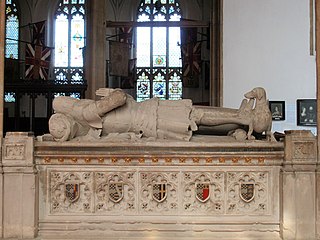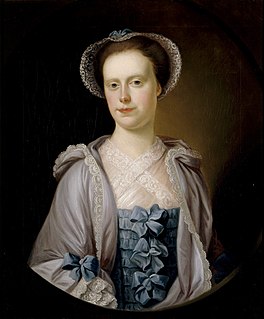
Thomas Patrick John Anson, 5th Earl of Lichfield was an English photographer from the Anson family. He inherited the Earldom of Lichfield in 1960 from his paternal grandfather. In his professional practice he was known as Patrick Lichfield.

Wilbert Vere Awdry was an English Anglican minister, railway enthusiast, and children's author. Better known as the Reverend W. Awdry, he was the creator of Thomas the Tank Engine, the central figure in his Railway Series.

Edward Smith-Stanley, 12th Earl of Derby PC, usually styled Lord Stanley from 1771 to 1776, was a British peer and politician of the late eighteenth and early nineteenth centuries. He held office as Chancellor of the Duchy of Lancaster in 1783 in the Fox–North coalition and between 1806 and 1807 in the Ministry of All the Talents.

Sir Robert Drury (1456–1536) was an English knight, Lord of the Manor of Hawstead, Suffolk, and Knight of the Body to Kings Henry VII and Henry VIII. As a politician he was Knight of the Shire for Suffolk, Speaker of the House of Commons, and Privy Councillor. He was also a barrister-at-law. His London townhouse was on the site of today's Drury Lane.

Newton is a civil parish and small village in Cambridgeshire, England. Situated around 7 miles to the south-west of Cambridge, it lies on the old coaching road between London and Cambridge. Its population in 2001 was 401, falling to 378 at the 2011 Census.

John Langhorne was headmaster of The King's School, Rochester and an educational innovator there. He has been called "Lamberhurst's first local historian"
Walter Brooke Cox Worthington was a member of the Maryland House of Delegates.

John Parker, 1st Baron Boringdon was a British peer and Member of Parliament.

Gregory Wale was a Cambridgeshire gentleman, a Justice of the Peace for Cambridgeshire and Conservator of the River Cam.
Sir Charles Wale KCB was an English General and the last British governor of Martinique between about 1812 and 1815. On 25 February 1831 he was appointed Colonel of the 33rd Regiment of Foot and was given the governorship in recognition of his role in the capture of Guadeloupe from the French in 1810. He was later knighted for his service.

Henry John Wale was an English author, soldier and church minister. He came from Little Shelford near Cambridge and was the son of General Sir Charles Wale. He served in the Crimea.

Harston is a village and civil parish in South Cambridgeshire, England, located around 5 miles (8 km) south of Cambridge. In 2011, it had a population of 1,740.

Abel Smith of Wilford House in the parish of Wilford, near Nottingham, England, was one of the leading bankers of his time and served thrice as a Member of Parliament.

Edward Harley, 2nd Earl of Oxford and Earl Mortimer, styled Lord Harley between 1711 and 1724, was a British politician, bibliophile, collector and patron of the arts.

Henrietta Harley, Countess of Oxford and Countess Mortimer was an English noblewoman, the only child and heiress of John Holles, 1st Duke of Newcastle and his wife, the former Lady Margaret Cavendish, daughter of Henry Cavendish, 2nd Duke of Newcastle-upon-Tyne.

Sir John Hynde Cotton, 3rd Baronet of Madingley Hall, Cambridgeshire was an English landowner and Tory politician who sat in the English and British House of Commons for 44 years from 1708 to 1752. The historian Eveline Cruickshanks called him "one of the most zealous Jacobites in England".
John Garnett (1707/08–1782) was an English bishop of Clogher in the Church of Ireland.
Sir John Cutts (1545–1615), of Horham Hall, Essex; Shenley Hall, Hertfordshire and Childerley, Cambridgeshire, was an English politician.

Sir John Howard, of Wiggenhall in Norfolk, was an English landowner, soldier, courtier, administrator and politician. His grandson John Howard became Duke of Norfolk and was grandfather of both Anne Boleyn and Catherine Howard, wives of King Henry VIII.

Margaret Fownes-Luttrell was a British heiress, the wife of Henry Fownes Luttrell. She was the heiress of Dunster Castle, under the stipulation in her father's will that her husband should take the additional surname of Luttrell. Four portraits of her exist in Dunster castle and a fifth at Bathealton Court.
















